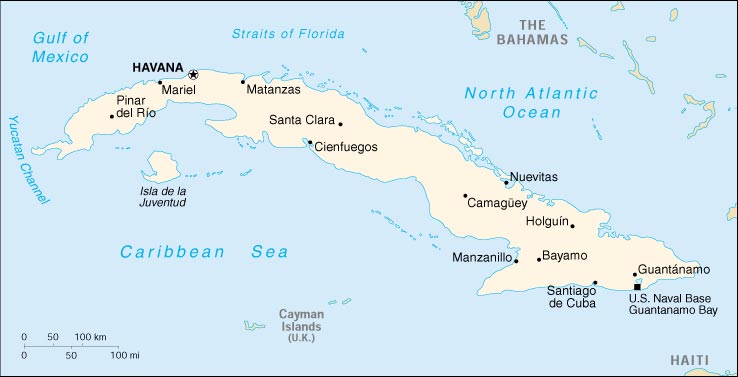| Revision as of 22:38, 2 June 2003 view sourceEfghij (talk | contribs)2,798 editsNo edit summary← Previous edit | Revision as of 22:39, 2 June 2003 view source Efghij (talk | contribs)2,798 editsNo edit summaryNext edit → | ||
| Line 22: | Line 22: | ||
| <tr><td>] | <tr><td>] | ||
| <br> - Total | <br> - Total | ||
| <br> - ]</td><td>] | <br> - ]</td><td>] | ||
| <br> 11,184,023 | <br> 11,184,023 | ||
| <br> 101/km² </td></tr> | <br> 101/km² </td></tr> | ||
| Line 112: | Line 112: | ||
| <hr align="center" noshade size="4" width="100%"> | <hr align="center" noshade size="4" width="100%"> | ||
| <center>] | |
<center>] | ]</center> | ||
Revision as of 22:39, 2 June 2003
- Alternate meanings: Cuba (god)
The Republic of Cuba is a Communist state located on the island of Cuba in the northern Caribbean Sea.
| |||||
| National motto: Xxxxx | |||||
| Official language | Spanish | ||||
| Capital | Havana | ||||
| President | Fidel Castro | ||||
| Area - Total - % water | Ranked 106th 100,860 km² Negligible | ||||
| Population
- Density | Ranked 67th
101/km² | ||||
| Independence
- Recognised | Spanish-American War
May 20, 1902 | ||||
| Currency | Cuban Peso | ||||
| Time zone | UTC -5 | ||||
| National anthem | La Bayamesa | ||||
| Internet TLD | .CU | ||||
| Calling Code | 53 | ||||
History
Main article: History of Cuba
The native population of Cuba was conquered by Spain in the 16th century. Starting in the mid 19th century the Cubans struggled to be independent of Spain. The United States of America intervened in the Spanish American War, occupying the island until recognizing independence in 1902; however the United States exersized considerable control over the Cuban government through the mid 20th century.
Fidel Castro led a rebel army to victory in 1959 against dictator Fulgencio Batista. He has led the country ever since. Between April 17 and 21 1961, there was a failed invasion of the Bay of Pigs by about 1500 revolution refugees, recruited, paid and trained by the United States' Central Intelligence Agency.
The country is now slowly recovering from a severe economic recession following the withdrawal of former Soviet subsidies, worth $4 billion to $6 billion annually, in 1990, and the strict US trade embargo in place since 1962.
Politics
Main article: Politics of Cuba
Cuba is republic led by President Fidel Castro, who is Chief of State, Head of Government, First Secretary of the Cuban Communist Party, and commander in chief of the armed forces. Many aspects of Cuban life are controlled through the Communist Party and its affiliated mass organizations, the government bureaucracy, and the state security apparatus. The Ministry of Interior is the principal organ of state security and control.
The Communist Party is constitutionally recognized as Cuba's only legal political party. The party monopolizes all government positions, including judicial offices.
Provinces
Main article: Provinces of Cuba
Cuba is divided into 14 provinces (provincias) and 1 special municipality (municipio especial), marked by a *:
Geography
Main article: Geography of Cuba
The Island of Cuba is located between the Caribbean Sea and the North Atlantic Ocean, south of Florida. It is the largest island in the Carribean. The Republic comprises the entire island, as well as Isla de la Juventud, however Guantanamo Naval Base is leased by the US.
Economy
Main article: Economy of Cuba
The Cuban Government continues to adhere to socialist principles in organizing its state-controlled economy. Most of the means of production are owned and run by the government and about 75 percent of the labor force is employed by the state. The state under the durable dictatorship of Fidel Castro plays the primary role in the domestic economy and controls practically all foreign trade.
Demographics
Main article: Demographics of Cuba
Cuba is a multiracial society with a population of mainly Spanish and African origins. The largest organized religion is the Roman Catholic Church. Afro-Cuban religions, a blend of native African religions and Roman Catholicism, are widely practiced in Cuba. Officially, Cuba has been an atheist state for most of the Castro era.
Culture
Main article: Culture of Cuba
| Date | English Name | Local Name | Remarks |
|---|---|---|---|
| January 1 | Liberation Day | ||
| July 26 | Rebellion Day |
